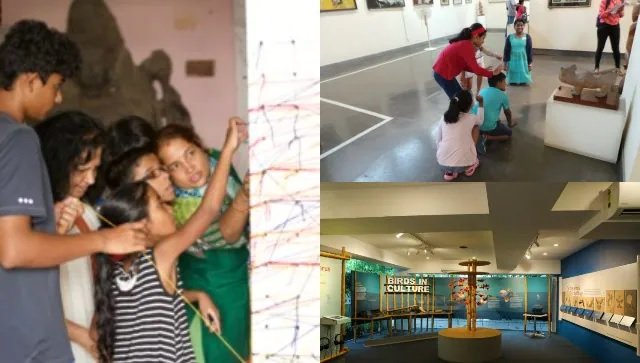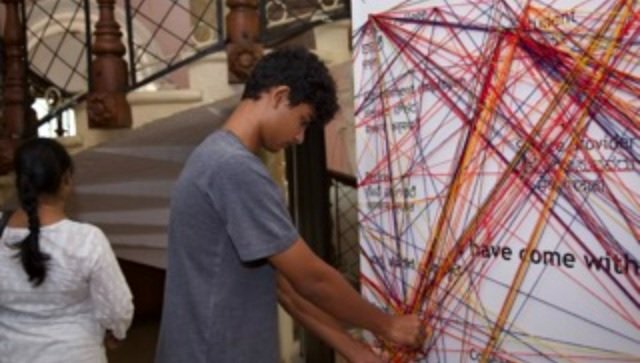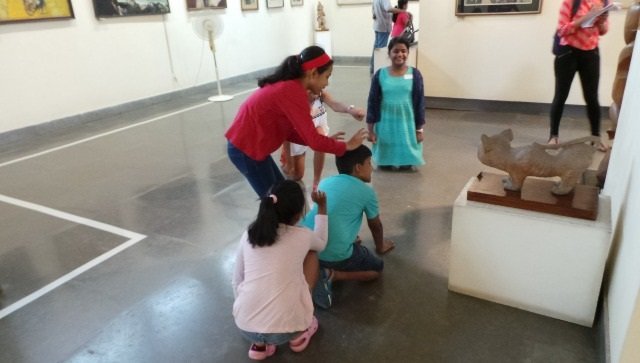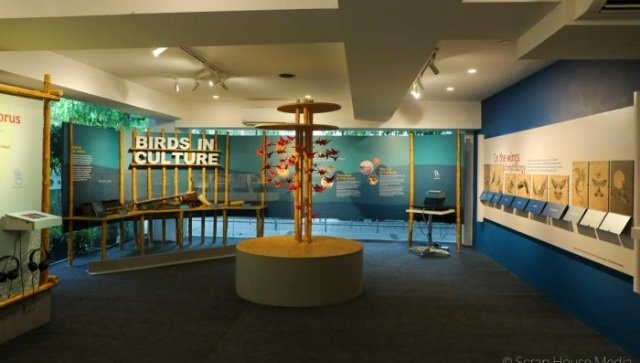These Indian museums are working to spread the message of climate change

Written by Noor Anand Chawla. Originally published by Firstpost, May 15, 2022
A new initiative called Indian Museums Against Climate Change (IMACC), is spearheading this movement in India. Launched by Bengaluru-based non-profit organization ReReeti, it brings together eight museums around the country to work for this common cause.
As a solo traveller navigating the beautiful countries of Spain and Portugal in my 20s, an afternoon that particularly stands out in memory was when I visited the Museo Nacional Centro de Arte Reina Sofia in Madrid. I vividly remember balking at the horrors of war in Picasso’s Guernica, feeling startled and moved in equal measure by the stark imagery of Dali’s works, and intrigued by the underlying message of Miro’s abstract forms. Closer home, I recall one of many fascinating and educational pre-pandemic visits to the National Museum in New Delhi, where I viewed an exhibit exploring the dietary practices of the Indus Valley people, millions of years ago. These museum visits – one the highlight of a coming-of-age trip and the other a lesson in history – are a testament to the influence that museums wield on people.
A museum is many things – a repository of artistic and cultural artefacts, a medium of imparting education, a place where history is preserved, and perhaps most importantly, a tool for instigating change through its widespread reach. Therefore, when it comes to spreading the message on the planet’s biggest crisis – climate change – it is museums that must lead the way. A new initiative called Indian Museums Against Climate Change (IMACC), is spearheading this movement in our country.
Launched by Bengaluru-based non-profit organisation ReReeti, it brings together eight museums around the country to work for this common cause. “IMACC is the organization’s attempt at making the Indian museum sector cleaner, greener and more sustainable. IMACC is the Indian local hub of Culture Declares Emergency, which is a growing global movement of people in arts and culture who believe that the cultural sector can take the lead in creating a regenerative future that protects the planet,” explains Tejshvi Jain, Founder-Director of ReReeti Foundation.

Since its launch in 2015, this organisation has been designing and executing programs to bring museums and cultural institutions closer to the public and help them engage with their audience. Their team seeks to empower museums to reach their maximum potential, regardless of whether they are just starting out or are already established.

For its latest project, ReReeti chose to focus on the climate crisis impacting human beings and their environments. Their programme attempts to combat this crisis by working with museums to implement a three-step approach, as a starting point towards reducing the impact of our common actions. Jain explains these three points as, “We work with museums to guide them in exploring climate change through their collections and the histories they tell. Museums will declare the ways in which they are fighting climate change through practices within the organization’s operations. We also collaborate with museums to support institutional initiatives like capacity-building workshops for museum professionals to train them in methods of fighting climate change. Further, we have already hosted our first quarterly meetup with the museums to evaluate IMACC’s progress and discuss the next steps. We will do what is possible to enable dialogue and expression amidst our communities about how the emergency will affect them and the changes that are needed.”
As a pilot project, they have started the initiative with eight museums which include Arna Jharna in Jodhpur, Dakshina Chitra Heritage Museum in Chennai, Indian Music Experience in Bengaluru, Kiran Nadar Museum of Art in Delhi, Kerala Museum in Kochi, Museum of Art and Photography in Bengaluru, Museum of Christian Art in Goa, and Museo Camera in Gurugram.
In-depth scrutiny and surveys were employed by the ReReeti team to determine the museums that would be part of this initiative. The main factor for selection was a responsive leadership open to radical and new approaches, which did not need to be convinced of the merits of the program. Secondly, the team was keen to include representation from the length and breadth of the country. They also wanted to work with museums that displayed a diversity of thought through their collections, to ensure that the message would spread in a variety of ways and lead to a more enriched overall experience.
Their careful selection is validated by the representatives of the museums as well. Akansha Rastogi, Senior Curator at the Kiran Nadar Museum of Art (KNMA) says, “Being part of the IMACC movement is a priority for us at the KNMA. We want to think about sustainability, climate footprint, energy orbits around arts and museums together with our visitors, artists and other museums. We also want to be able to use artistic expression to bring awareness and consciousness about the climate crisis. Towards this goal, KNMA will soon be launching our first book titled ‘Museum and Sustainability’ led by artist and environmentalist Ravi Agarwal and our curatorial team. This book is conceived as a workbook and an invitation to all museum-goers. This Summer , we are also working towards developing engagement modules in relation to museum collection and climate change stories.”
While the KNMA readies itself for its first project, other museums are also taking their commitment to the cause seriously. On April 6, all eight museums took part in ReReeti’s first quarterly workshop held on Zoom. Called ‘Putting an Eco-lens on Museum Collections’, it was facilitated by the Climate Museum in the UK. The workshop taught the participant museums to take a closer look at their objects and find links with the climate crisis, as these connections may not be obvious at first glance.

Jain explains, “At regular intervals, each museum will be posting something from their collection which talks about sustainability through the objects on display. We are amazed at the wonderful response we have received so far. We thought museums would take a year or two to be accustomed to this major change, yet many are raring to go already. The Indian Music Experience (IME) in Bengaluru has rolled out its first exhibition dedicated to the cause.” This exhibit highlights aspects of ecology by focussing on birdsongs shown through musical instruments inspired by birds, audio-visual kiosks showcasing bird calls, and graphic panels. Jain is happy to see the museums taking charge and being instruments of change in simple ways. “We become a stronger voice when we work together,” she asserts.
Climate change, though a matter of grave global concern, still remains to be taken seriously in most Indian quarters. Hence, art and culture are perhaps the best mediums to effectuate lasting societal acceptance. As India is an incredibly complex country of many diversities, the IMACC initiative of ReReeti through its eight participant museums – all of which have distinctive artistic sensibilities and varied target audiences – hopes to translate this commitment into reality in the most widespread and attractive manner.
Noor Anand Chawla pens lifestyle articles for various publications and her blog www.nooranandchawla.com. She can be reached on nooranand@gmail.com.